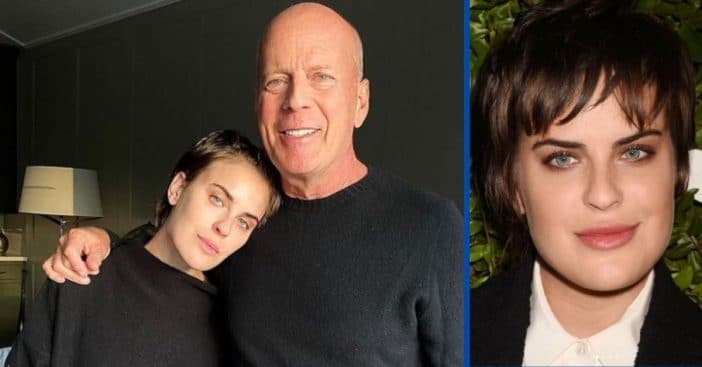
At the age of 27, Tallulah Willis has often heard she most resembles her father Bruce Willis, as opposed to her mother Demi Moore. Regardless of any innocent intention, these statements actually wore heavily on Tallulah to the point she blamed herself and felt resentful and lost searching for her identity.
These comparisons between her and her father, for instance, made Tallulah feel she was without any feminine qualities and that, in turn, made her impossible to love. On Instagram, she shared her whole emotional journey and steps she took to navigate out of painful emotional places it took her.
Being compared to father Bruce actually wore heavily on Tallulah Willis’ self-worth
View this post on Instagram
For much of her life, Tallulah Willis was told she looked specifically like a twin to her father Bruce Willis. These outweighed comparisons to her mother, Willis’ ex-wife Demi Moore. Tallulah recently had cause to share the exciting news of her engagement to Dillon Buss, but now she’s using Instagram to share her body dysmorphia journey and some important advice she learned from it that others might benefit from hearing too.
RELATED: Tallulah Willis Seeks Brain Scan To Better Understand ‘Series Of Personal Struggles’
Her post begins with a trigger warning that the content in question would be exploring issues of body image. Various pictures of Tallulah and Moore accompany the post, which beings, “Took me way too long to realize that: A. Aging happens without your control, time passes and your face can change. I punished myself for not looking like my mom, after being told I was BW twin since birth – I resented the resemblance as I believed wholly my ‘masculine’ face was the sole reason for my unlovability – FALSE!”
Lessons learned and taught
View this post on Instagram
At this point, Tallulah dedicated time to sharing how she navigated her uncomfortable feelings when told she looked more like her dad. Her post went on, “I was/am inherently valuable and worthy, at any life stage, at any size, with anyhair do! (As are you).”
View this post on Instagram
She then implores followers to look inward and find a place within themselves they can find joy “before trying to ‘fix’ the outsides.” For this, she advises various activities around the house to limit exposure to things that might put someone in a negative headspace. But she also urges everyone whose words might impact volatile minds, “Be mindful of the special and impressionable minds around you and their access to social media and potential triggering imagery or the indicators that hyper-focusing on ones appearance goes deeper then just wanting to feel good in their own skin.”
View this post on Instagram
Ultimately, she writes, “We all want to feel good, and confident but when it creeps into a deeper, spookier place where it begins to devour your essence bit by bit, ask for help. Do not feel ashamed, this is not a ‘stupid, vain issue’ this is a genuine psychological pain and I see you so clearly and witness the validity in your struggle.”
